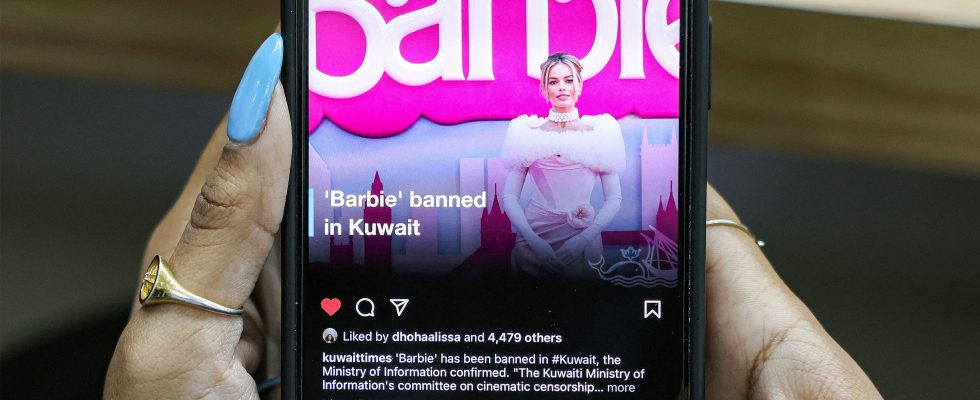From France, difficult to imagine yourself within a censorship committee examining the film Barbie from every angle. Imagine: a group of adult men, gathered in a small room to watch for nearly two hours Ryan Gosling and Margot Robbie jiggle in leotards. Then this 100% male group will debate for several days, even several weeks, the danger that the blonde doll who has become a feminist would pose, or not, to the morality of their millions of fellow citizens. Result, Barbie finds itself banned in Iran, Kuwait, Algeria or, more surprisingly, Lebanon.
In other countries, censorship boards have delayed the release of the film, which is barely landing in the region after grossing $1 billion at the global box office in less than a month. In her suddenly feminist struggle, Mattel’s blonde doll divides patriarchal societies and illustrates the changes taking place in the Arab world.
The pink wave even reaches Riyadh
Unchecked by the authorities, the most enthusiastic reaction is taking place in the Gulf, where the madness Barbie has taken over megalopolises, with cinemas painted pink for the occasion. In some establishments in Riyadh, the Saudi capital, around fifteen sessions are full every day.
This pink wave on the Saudi capital embodies the revolution underway in the Wahhabi kingdom: eight years ago, cinemas were still prohibited in Saudi Arabia, as was music or driving licenses for women. Under the reign of Crown Prince Mohammed bin Salman, as authoritarian as he is a reformer, Saudi youth (those under 30 represent two-thirds of the population) can rush into dark rooms with fingernails painted pink. “Saudi Arabia has gone through major changes in the areas mentioned by Barbie, in particular concerning the place of women in the public space, explains Kristin Diwan, researcher at the Arab Gulf States Institute, in Washington. The success of the film in the country shows the extent of this evolution. The authorities have understood the need, particularly economic, to attract foreign visitors and talent, and therefore to become a more welcoming society. accept the wave Barbie is a good indicator of their willingness to change.”
According to the New York Times, Saudis even have access to an uncensored version of the film, which features openly gay actors and a transgender actress. “The Saudi authorities can rely on the content of Barbie, very subtle and based on a humor that allows him to attack gender inequalities in an innocent way, believes Kristin Diwan. It contains no explicit sexual content and does not openly discuss homosexuality or transgender issues. The story would no doubt be very different if these subjects were explicitly addressed in the film…”
A few years ago, however, Saudis had to take their car to see films in the neighboring Kingdom of Bahrain. Paradoxically, Lebanon and Kuwait were seen more as havens for freedom of expression in the region. But both countries are facing a wave of religious radicalism, led by increasingly powerful and extremist Muslim parties. Impossible for them to let Barbie go free. “The parallel between the reception of the film in the Gulf and the ban in Lebanon is particularly striking, emphasizes Kristin Diwan. Lebanon has always been the most open and tolerant country in the region, but the weakening of the political authorities leaves space and power to the religious.”
In Beirut, you have to please Hezbollah and its supporters to maintain influence, like the Minister of Culture, who ordered a ban on Barbie, accused of “promoting homosexuality [et de] question the need for marriage and the family”. Abbas Mortada has probably not seen Mattel’s film, which does not present any homosexual or even romantic relationship. But, in a country where the leader of Hezbollah, the whole -powerful Hassan Nasrallah, claims that homosexuality be punishable by death, it seems fashionable to show the muscles in front of a feminist doll.
Other countries in the region, such as Iraq and Jordan, have postponed the film’s release until August 31, while their censors consider whether or not to ban it. Barbie. The little blond doll continues to frighten the censors with her decidedly very fragile virility.
